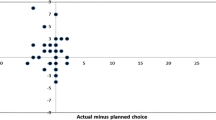Abstract
We report the results of experiments conducted over the internet between two different laboratories. Each subject at one site is matched with a subject at another site in a trust game experiment. We investigate whether subjects believe they are really matched with another person, and suggest a methodology for ensuring that subjects’ beliefs are accurate. Results show that skepticism can lead to misleading results. If subjects do not believe they are matched with a real person, they trust too much: i.e., they trust the experimenter rather than their partner.
Similar content being viewed by others
References
Andreoni, J., & Ragan, P. (2004). Trusting appearances and reciprocating looks: Experimental evidence on gender and race preferences. Unpublished manuscript, Georgia State University.
Anderhub V., Rudolf, M., & Carsten, S. (2001). Design and evaluation of an economic experiment via the internet. Journal of Economic Behavior and Organization, 46(2), 227–247.
Ashraf, N., Iris, B., & Piankov N. (2004). Is trust a bad investment? Kennedy School, Harvard University, Working Paper.
Asparouhova, E., Peter, B., & Charles, R. P. (2003) Excess demand and equilibration in multi-security financial markets: The empirical evidence Journal of Financial Markets, 6, 1–21.
Berg, J., Dickhaut, J., & McCabe, K. (1995). Trust, reciprocity and social history. Games and Economic Behavior, 10, 122–142.
Bellemare, C., & Kröger, S. (2004). On representative social capital. Tilburg University, CentER Working Paper 2004–57.
Blount, S. (1995). When social outcomes aren’t fair: The effects of causal attributions on preferences. Organizational Behavior and Human Decision Processes, 63(2), 131–144.
Bossaerts, P., & Plott, C. (2004). Basic principles of asset pricing theory: Evidence from large-scale experimental financial markets. Review of Finance, 8(2), 135–169.
Bossaerts, P., & Plott, C., Zame, W. R. (2003). Prices and portfolio choices in financial markets: Theory and experimental evidence, CalTech Working Paper.
Bossaerts, P., Plott, C., & Zame, W. R. (2002). Prices and portfolio choices in financial markets: Econometric evidence, CalTech working paper.
Buchan, N. R., Croson, Rachel T. A., & Dawes, R. M. (2002). Swift neighbors and persistent strangers: A cross-cultural investigation of trust and reciprocity in social exchange. American Journal of Sociology, 108(1), 168–206.
Burnham, T., & McCabe, K. et al. (2000). Friend-or-foe intentionality priming in an extensive form trust game. Journal of Economic Behavior & Organization, 43(1), 57–73.
Croson, R., & Nancy, R. B. (1999). Gender and culture: International experimental evidence from trust games. American Economic Review, 89(2), 386–391.
Eckel, C. C., & Wilson, R. K. (2003). Conditional trust: Sex, race, and facial expressions in a trust game. paper prepared for the conference on trust and institutions, Harvard University, April 24–26.
Eckel, C. C., & Wilson, R. K. (2004). Is trust a risky decision? . Journal of Economic Behavior and Organization, 55(4), 447–466.
Eckel, C. C., & Wilson, R. K. (2005). Detecting trustworthiness: Does beauty confound intuition? unpublished manuscript, department of economics, Virginia Tech, March.
Forsythe, R. et al. (1992). Anatomy of an experimental political stock market. American Economic Review, 82(5), 1142–1161.
Frohlich N., Oppenheimer, J., & Bernard Moore, J. (2001). Some doubts about measuring self-interest using dictator experiments: The costs of anonymity. Journal of Economic Behavior and Organization, 46(3), 271–90.
Glaeser, E. L., & Laibson, D. et al. (2000). Measuring trust. Quarterly Journal Of Economics, 115(3), 811–846.
Hayashi, N., Ostrom, E., Walker, J., & Yamagishi, T. (1999). Reciprocity, trust, and the sense of control - A cross-societal study. Rationality and Society, 11(1), pp 27–46.
Hoffman, E., McCabe, K., Shachat, K., & Smith, V. (1994). Preference, property rights and anonymity in bargaining games. Games and Economic Behavior, 7(3), 346–80.
Hoffman, E., McCabe, K., & Smith, V. (1996). ‘Social distance and other-regarding behavior in dictator games.’ American Economic Review, 86(3), 653–60.
Holt, C. A., & Laury, S. K. (2002). Risk aversion and incentive effects. American Economic Review. 92(5), 1644–55.
Lucking-Reiley, D. (1999). Using field experiments to test equivalence between auction formats: Magic on the internet. American Economic Review, 89(5), 1063–1080.
McCabe, K., Houser, D., Ryan, L., Smith, V., & Trouard, T. (2000). A functional imaging study of cooperation in two-person reciprocal exchange. In Proceedings of the National Academy of Science, 97, 3777–3781.
Plott, C. R. (2000). Markets and information gathering tools, Southern Economic Journal, 67(1), 1–15.
Resnick, P., & Zeckhauser, R. (2001). Trust among strangers in internet transactions: Empirical analysis of ebay’s reputation system. Draft prepared for NBER workshop on empirical studies of electronic commerce.
Roth Alvin, E., & Ockenfels, A. (2002). Last-minute bidding and the rules for ending second-price auctions: Evidence from eBay and amazon auctions on the internet. American Economic Review, 92(4), 1093–1103.
Roth Alvin, E., Prasnikar, V., Mashiro, O.-F., & Shumel, Z. (1991). Bargaining and market behavior in Jerusalem, Ljubljana, Pittsburg, and Tokyo: An experimental study. American Economic Review, 81(5), pp. 1068–95.
Scharlemann, J. P. W., Eckel, C. C., Kacelnik, A., & Wilson, R. K. (2001). The value of a smile: Game theory with a human face. Journal of Economic Psychology, 22(5), 617–640.
Shavit, T., Sonsino, D., & Benzion, U. (2001). A comparative study of lotteries-evaluation in class and on the web. Journal of Economic Psychology, 22(4), 483–491.
Snijders, C., & Keren, G. (1999). Determinants of trust. In D. V. Budescu, I. Erev and R. Zwick (Eds.), Games and behavior: Essays in honor of Amnon Rapoport, Mahwah, NJ pp. 355–383.
Werner, G., Carsten, S., & Matthias S. (forthcoming) Fairness in the mail and opportunism in the internet - A newspaper experiment on ultimatum bargaining, German Economic Review, 4(2), 243–265.
Zuckerman, M. (1994). Behavioral expressions and biosocial bases of sensation seeking. New York, Cambridge University Press.
Author information
Authors and Affiliations
Corresponding author
Additional information
JEL Classification C9
Rights and permissions
About this article
Cite this article
Eckel, C.C., Wilson, R.K. Internet cautions: Experimental games with internet partners. Exp Econ 9, 53–66 (2006). https://doi.org/10.1007/s10683-006-4307-4
Received:
Revised:
Accepted:
Issue Date:
DOI: https://doi.org/10.1007/s10683-006-4307-4




